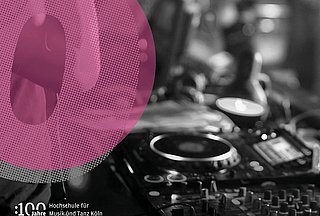Master of Music -
Instrumental Composition
Professionalization of one's own art.
Instrumental Composition is a course of study for current trends in contemporary art music with an instrumental and vocal focus. The course can include compositional work ranging from solo to orchestral, performative or music-theatrical compositions. Hybrid works incorporating new and the latest technologies can also be part of the program. There is also the opportunity to focus on electronic media.
In the studio for electronic music, projects with mixed forms of instrumental and electronic music can be realized and the possibilities of today's electronic technology can be tested under the supervision of specialists in transmedia composition. (e.g. sensor technology, AR/VR/XR). Applicants with previous knowledge and a corresponding previous degree can specialize further in the course of the Master's degree. Students with degrees in other areas can broaden the spectrum of their artistic work by studying music composition. A prerequisite for the Master's degree in Instrumental Composition is the completion of a Bachelor's degree in Composition or a comparable course of study. Specialized previous studies in the field of electronics are not necessary. Only in exceptional cases of exceptional talent and previous education can Bachelor graduates from other art or computer science fields be admitted.
If you have any questions about the degree program, please get in touch with the responsible contact person(s).
Basic information
| Degree | Master of Music |
|---|---|
| Period of study | 4 Semester |
| Course begin | Wintersemester |
| ECTS points | 120 Credits |
| Major subjects | Instrumentale Komposition |
| Continuing study options | Concert exam |
Additional information about the study program
During the course of study, students acquire fundamental and in-depth knowledge in the field of instrumental and vocal composition in small and larger ensembles and try it out in practice in a variety of ways. The main focus of the main course of study is on the performance of students' works in and, if possible, outside the university. Close cooperation with external institutions, with ensembles or festivals for new music offers composition students professional performance conditions within the framework of their studies.
Special features of the study
The field of work of today's composers has expanded significantly. In addition to concert music, the fields of theater, film, video, installation, performance, radio play or music in digital environments (AR/VR/XR) have come into focus. The practical orientation and intended diversity in the study program should guarantee that versatile opportunities open up for the composers* after graduation. In addition, students are involved in internal and external projects at an early stage in order to establish a network with musicians, event organizers, but also with artists from other fields. For several years now, the Institute for New Music at HfMT Cologne has been working closely with the Ensemble Musikfabrik. The ensemble's specialized musicians perform new compositions by students in two concerts each year as part of the Adventure cooperation. The broad and flexible range of educational opportunities allows students to individually shape their studies and career prospects. In many cases, graduates do not work exclusively as composers after graduation. As in other professional fields, composing is rarely limited to one area, but rather requires flexibility and versatility. However, this flexibility is not to be understood in the sense of adaptation, but rather as the ability to shape one's studies and subsequent professional activity independently. Today's composers are not only responsible for their own music, but also for their professional careers.
Application and aptitude test
Applications are submitted online via the muvac platform. All information on the procedure can be found on our application page.
Admission requirements
- Successful completion of a four-year bachelor's degree or equivalent in composition. Admission with an undergraduate degree in Electronic Composition is also possible.
- Students who did not obtain their degree at a German-speaking institution must prove that they have sufficient German language skills (min. level A2 according to the European Framework of Reference).
- Successfully passed aptitude test.
Qualifying examination
The qualifying examination consists of a colloquium with the presentation and discussion of submitted works, with questions about the student's own musical aesthetics and positioning within the broad field of contemporary music. Detailed information can be found in the Qualifying Examination Regulations, especially in the appendix for content requirements and conduct of the examination.
Course of studies and examination regulations
In the master's program, the focus is on independent compositional work and professionalization. In addition to the presentation of own works, it is mainly about the design and organization of events, also outside the university. The instrumental and electronic composition classes work closely together. It is possible to participate in projects of the respective other area and also to temporarily receive corresponding main subject lessons. The master's program is completed with a self-organized concert or comparable event with music created during this study and a colloquium.
Documents & downloads
Further downloads can be found on our central download page .
Current events
ehemaliges Autohaus Dresen Köln


Contact
|
brigitta.muntendorf@hfmt-koeln.de |
|
| Address |
Hochschule für Musik und Tanz Köln Unter Krahnenbäumen 87 50668 Köln |
|
Miroslav.Srnka@hfmt-koeln.de |
|
| Address |
Hochschule für Musik und Tanz Köln Unter Krahnenbäumen 87 50668 Köln Hochschule für Musik und Tanz Köln Unter Krahnenbäumen 87 50668 Köln |